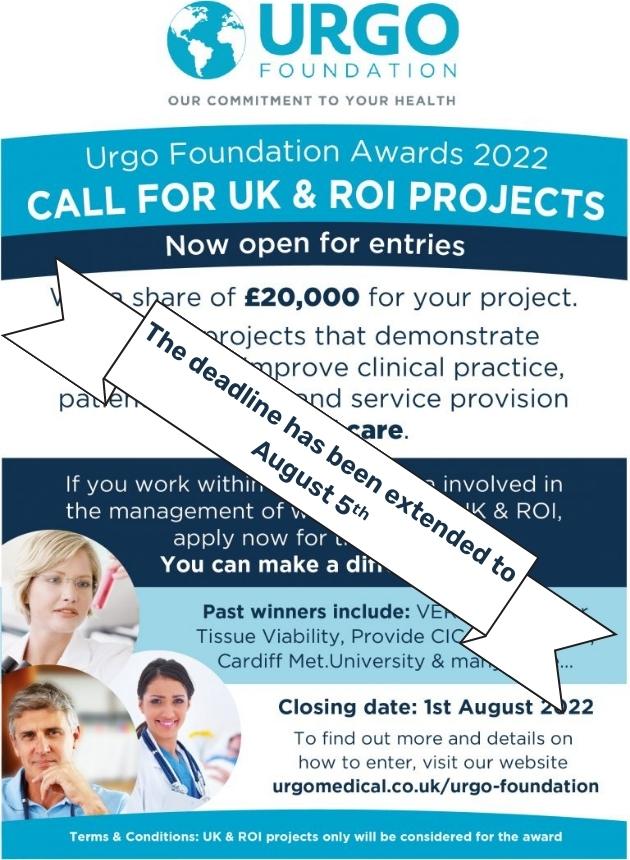Registration to the 2022 edition is now open!
To apply, please complete the application form available here.
Closing date: 1st August 2022 Extended to 5ᵗʰ August 2022

Supporting innovative and original projects within wound care
 The Urgo Foundation was created in December 2009 to extend the reach of Laboratoires URGO’s commitment to public health. It focuses on three key areas:
The Urgo Foundation was created in December 2009 to extend the reach of Laboratoires URGO’s commitment to public health. It focuses on three key areas:
- Scientific/clinical research
- Health education and training
- Preventative health initiatives
 Awards are given to projects aiming to improve clinical practice, patient outcomes and service provision in wound care.
Projects are judged on the following criteria:
Awards are given to projects aiming to improve clinical practice, patient outcomes and service provision in wound care.
Projects are judged on the following criteria:
- Evidence-based decision making
- Saving costs
- Improving quality of life
- Infection management
- Improving diagnosis
- Patient/caretaker training
- Improving patient concordance
- Clinical management (patient, wound, pathway)
- Epidemiological data and healthcare networks
Meet our previous winners
2021:
Sandip Nandra – Consultant Vascular Surgeon, VERN: The DEFINITE Audit – Prospective Audit of Diabetic Foot Debridement in Theatre –
- Patients have shared that they fear limb-loss. They have also shared varied experiences from around the UK and beyond. Therefore: The primary aim of this unique audit is to understand the pathway of care for patients with diabetes who undergo a digital amputation and/or foot wound debridement and compare surgical practice with the IWGDF and Global Vascular Guidelines
Kimberley Wilde – Advanced Podiatrist, Manchester Local Care Organisation: Living well with a Diabetic Foot Ulcer/Amputation – How to Keep your Heart, Legs and Circulation Healthy’
- The aim of this project is to develop a safe limb and cardiovascular exercise regime with DM who have ulcerated feet or who have a lower limb amputation, to keep their heart, legs and circulatrory system as healthy as possible. Develop a working group with podiatry, physio, diabetologist and patient representation, and training relevant staff for clinics.
2020:
Tissue Viability Service (TVS) : Skincare Champion Project
- The aim was to develop a group of skin care champions working in home care and care homes in England and Northern Ireland to enable them to provide excellence in skin care for their clients/residents.
- To develop skin care champions who will have:
- An agreed addendum to their job description and objectives to champion skin care, including the prevention of pressure ulcers and care of the lower limb.
- Have successfully completed a specific programme of education.
2019:
Dr Julie Green & Ellie Lindsey MBE: A service evaluation of the Quality of Life (QoL) Wound Checklist:
- Evidencing the impact of the impact of the QoL Wound Checklist on personalised care, self-assessed QoL, member concordance and personal well-being with ‘Leg Clubs’.
- To date, the QoL Wound Checklist has been implemented across a number of clinical areas and is cited within the Manchester Leg Ulcer Pathway, by the National Institute of Health and Care Excellence (NICE, 2019) as an example of good quality documentation. This project proposal aims to build on this accolade by evidencing the impact of the checklist on disclosure, clinician awareness, concordance, etc. in a ‘new’ clinical area, Leg Clubs. This proposal details the implementation of the checklist across established Leg Clubs, in collaboration with the Leg Club founder, Ellie Lindsay.
Michelle Goodeve, Laura Saunders, Clare Surridge – PROVIDE; Diabetic foot care education video : A Patients perspective
- This Project aims to develop a video from a patients perspective on what Diabetic and foot care advice they wished they had received or listened to before they went on to develop a foot ulceration. This video hopes to give patients a more relatable approach to advice that we hope will be emotive and empower patients to take ownership of their health and ultimately reduce the risk of foot ulcerations.
Sarah Curran, Joanne Fawcett, Cardiff Metropolitan University; Medical moulage – Its place in education and diabetic foot ulcers
- Currently there is a lack of information using moulage to create a simulated diabetic foot ulcer and how this scenario impacts learners, immersion and understanding. The aim of this project sets out to use a mixed method approach to explore perceptions of undergraduate podiatry students for their preparedness of complex care, diagnosis and assessment in cases with diabetic foot ulcers through the use of moulage.
